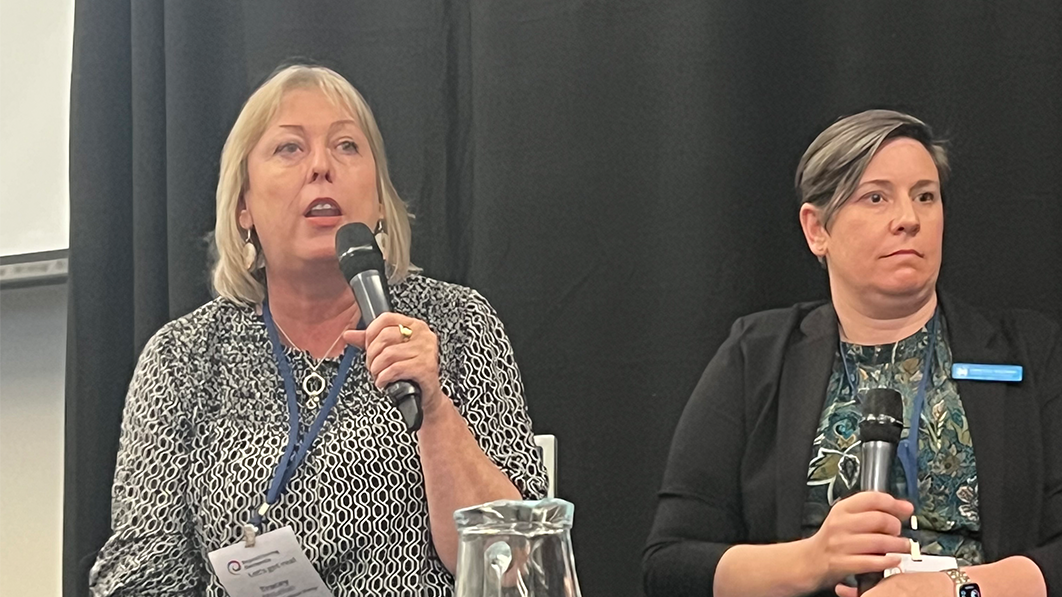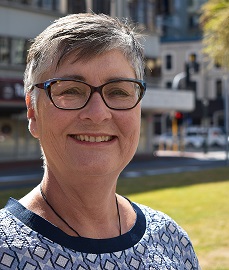Politicians need to get real about dementia mate wareware this election
Alzheimers NZ Chief Executive Catherine Hall encouraged decision makers to get real at the latest one-day event by Alzheimers NZ, Repositioning Dementia: Let’s get real, in September.


Right, the countdown to the election is well and truly on and I must admit to feeling a bit jaded on that front – and we’ve still got a few weeks to go!
The various Parties are doing a good job of announcing policies aimed at that all-important swing voter, but… and here’s my pet gripe – I’ve yet to hear much that gives me hope that any of the Parties have remembered we have a rapidly ageing population which is only going to add more and more pressure to our already over-stretched health system.
This is frustrating because I did think our policymakers were ‘getting real’ and we would going to see some tangible action to address the huge impact dementia mate wareware has on the lives of so many New Zealanders and the huge challenge it poses to our health system.
And that’s one of the reasons we introduced these one-day events – because we felt the pace of change was speeding up and we needed to be agile and flexible enough to celebrate and discuss new initiatives as they came to pass.
In our optimism we subtitled our March Conference ‘A new start’. Because that was how it felt:
- The health sector changes were in place – Te Whatu Ora/Te Ake Whai Ora and the new Aged Care Commissioner
- Cabinet had endorsed the Dementia Mate Wareware Action Plan
- Budget 2022 had provided funding for some post-diagnostic support and respite pilots, and for a governance ecosystem
- The Dementia Mate Wareware Leadership and Advisory Group was in place with strong representation from the four partners who wrote the Action Plan
As a community, we were also cautiously excited by the tremendous opportunities and potential offered by the reports of new drugs on the horizon. And since then, the tender process for the respite pilots received over 70 expressions of interest, highlighting the strength of the sector, and new pilots have actually been established.
So, there were all the signs of a new start and a real sense of positivity! But the reality is there has been nothing since so we are still waiting for a decision to implement the Action Plan and funding to start to help all of the struggling whānau across the dementia mate wareware journey.
Unfortunately, this isn’t the first time the dementia mate wareware sector has felt optimistic, only to be let down. In 2013, we were excited by the development of the Aotearoa New Zealand Framework for Dementia Care. And in 2017 – when the World Health Assembly adopted the Global Action Plan on the Public Health Response to Dementia 2017 -2025.
And again in 2020 when both main Parties backed the Dementia Mate Wareware Action plan. After each of these milestones, we expected government to step up with their cheque book and implement the Plan.
But now it seems it’s time for us to ‘get real’. To acknowledge that, once again, many of our politicians have decided that our dementia mate wareware community is not sufficiently deserving of their support.
They’ve found other ‘priorities’ and channelled their energies and their money into other, more voter-friendly causes. Speaking of the next government only a month away, what can we expect?
Well, as I said earlier, there’s little focus on the ageing population by the main parties and the recent Pre-election Economic and Fiscal Update 2023 confirmed the pressure is not going out of the economy or off cost of living anytime soon.
With that in mind, the National Party has actually walked back its 2020 commitment to support the implementation of the Dementia Mate Wareware Action Plan and its focus on ageing seems to start and finish with residential care!
If we have a National/Act coalition, expect attention to focus on regulatory reform and tax cuts – and the need to economise to pay for those cuts. Don’t ask me what will happen if Winston is in the mix!
Labour has confirmed its support but if they are returned as part of a coalition, they will face significant fiscal constraints and a range of ‘bottom lines’ and other political pressures that may divert attention from the initiatives on which our sector needs urgent action. They have said they will be making a funding announcement next week – fingers crossed that announcement focusses on supporting a real and material improvement in access to services!
So, what does all of that say about our chances of getting much-needed additional funding to pay for implementing the Dementia Mate Wareware Action Plan – because implementing it will require more funding – let’s get real about that!
And what about the extra funding support our local Alzheimers and dementia organisations need? They are so poorly funded now they can only support around 13 per cent of the people who need help – and even then it’s a once-over-lightly support because that’s all they can afford to do. Fixing that and aligning the services to the Action Plan and Pae Ora, and is urgently needed, is going to require a big boost in funding.
On top of that, improvements in diagnosis rely at least in part on improvements in funding for primary care, there’s a great deal more needed for whānau carer support, and Aotearoa New Zealand will need significantly more home care and residential beds as numbers continue to grow. All of this needs money too!
And what of the health sector in general? Even thinking about the list of problems is tiring.
Workforce shortages, pay equity, fair pay challenges, constraints on services, support and treatment everywhere you look, ageing health infrastructure, an under-pressure and under-resourced health NGO sector.
And if you are living with dementia mate wareware, as so many New Zealanders are, then you face massive constraints of vital support services, making your whole life so much harder than it has to be. We’ll hear more on this later this morning.
So, far from coming together today to celebrate a turning point today, as I had very much hoped we might, we need to get real and realise that our work is definitely not done – nowhere near it – and our fight for more and better services as described in the Action Plan is far from over.
The system won’t change on its own! But there is a salutary lesson. After Thomas Edison finally succeeded in inventing the electric lightbulb, he acknowledged that he tried and failed thousands of times before he got it right.
When asked about this by a journalist of the time he noted that he hadn’t ‘failed’ each of those times; he’d just moved one step closer to success each time. And that’s the mindset we need to adopt as a sector. We all have a role to play in moving us closer to our version of success.
Part of that is supporting our friends and partners on the Dementia Mate Wareware Leadership and Advisory Group by being active members of the Network – and it’s been great to meet some people I hadn’t met before through that network.
Part of it is continuing to advocate publicly with our candidates now and our MPs and Ministers post-election, reinforcing to them the urgent need for change.
Because we need to keep the pressure on. No, let me rephrase that. We need to increase the pressure. And we have an opportunity to do that this afternoon when we have spokespeople from five parties joining us – not the health spokespeople in most cases which is disappointing, but even so do make sure you ask plenty of questions and challenge them so they are in doubt about what the sector thinks!
We can also do that by doing our bit to reinforce and promulgate the evidence that already exists on what is needed. Because there’s plenty of evidence now for what works – the time for investigation is well past and it’s now time for government action, in particular using the evidence on what works to:
- deliver more timely diagnosis, better and more accessible community-based support, and support to help whānau carers – reducing the pressure on whānau and the health system
- make the most of all of the evidence-based tools and programmes that exist but are not yet supported – MANA, CST, activities, support groups and programmes which improve function and slow cognitive loss, education programmes
- and focus on risk reduction measures to take the opportunities that we know exist to reduce the numbers of people living with dementia mate wareware in future and slow cognitive decline for those with a diagnosis.
These are all at the heart of implementing the Action Plan and we’ll hear more about most of these today.
And we can all do that by doing our bit to challenge the stigma and discrimination that affects the opportunities people living with dementia mate wareware have and the way we are treated.
It’s ironic, isn’t it, that we want to support our health system by doing what we can within our sector, while the system itself seems so uncaring of us. I don’t envy the next Health Minister!
But whoever he or she is we need them to get real about the dementia mate wareware challenge and quickly. At the very least we need them to start taking the impact of the ageing population, the rising demand and the increasing numbers of struggling whānau seriously now.
And we need them to start monitoring the key indicators because we know that what gets measured gets done. If the new Minister is National’s Dr Shane Reti, we hope he applies his same enthusiasm for health sector ‘indicators’ to our sector.
And we need to help them understand what ‘done’ looks like for the Action Plan; identifying those three or four key outcome indicators so the system can be held accountable for the direction of travel.
Beyond that, I’m afraid things are a little unclear and will probably remain so until the new Te Whatu Ora structures bed in. We hope the Ageing Well Strategic Design Network will be able to build the Pae Ora and Action Plan principles into the design of the new system and integrate the services and funding across the system as a whole.
Because that’s not the situation now where funding for older people is split into five silos, and the aged care review will be considering residential care and home support funding in isolation to that wider system!
However, we are already seeing Te Whatu Ora managing expectations around that, reminding us all that everything needs to be fixed and it will all take time.
But just for once I’d like to change the record. I’d like to shift the dial away from platitudes and excuses and see far more effort made to find workable solutions. Platitudes ignore the realities of people’s lives and the difficult journey that people with dementia mate wareware are on. Solutions make the journey easier.
So… a challenging ‘eco-system’ for us all and not a little upsetting, which is why I’m feeling a little jaded. But also, on the flip side, another opportunity. And as Winston Churchill famously said: “A pessimist sees the difficulty in every opportunity; an optimist sees the opportunity in every difficulty.”
Happily, I’m with Winston – no not that one. The other one!
Pictured above: Labour’s Tracey McLellan and National’s Vanessa Weenink at the recent event

